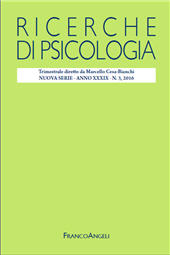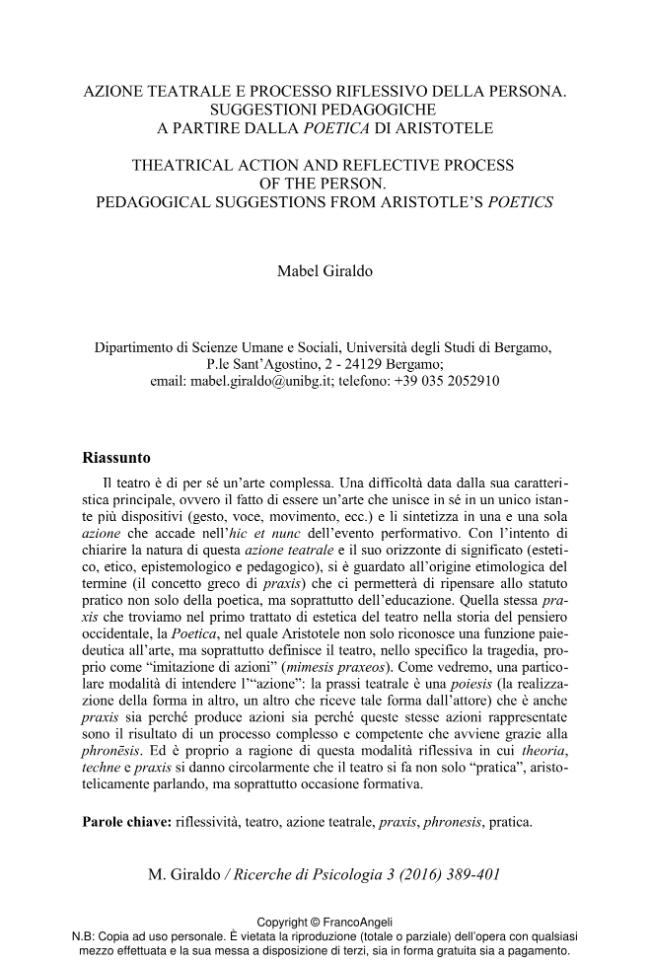Azione teatrale e processo riflessivo della persona : suggestioni pedagogiche a partire dalla poetica di Aristotele
389-401 p.
Theatrical action and reflective process of the person. Pedagogical suggestions from Aristotle's poetics.
Il teatro e di per se un'arte complessa. Una difficolta data dalla sua caratteristica principale, ovvero il fatto di essere un'arte che unisce in se in un unico istante piu dispositivi (gesto, voce, movimento, ecc.) e li sintetizza in una e una sola azione che accade nell'hic et nunc dell'evento performativo. Con l'intento di chiarire la natura di questa azione teatrale e il suo orizzonte di significato (estetico, etico, epistemologico e pedagogico), si e guardato all'origine etimologica del termine (il concetto greco di praxis) che ci permettera di ripensare allo statuto pratico non solo della poetica, ma soprattutto dell'educazione. Quella stessa praxis che troviamo nel primo trattato di estetica del teatro nella storia del pensiero occidentale, la Poetica, nel quale Aristotele non solo riconosce una funzione paiedeutica all'arte, ma soprattutto definisce il teatro, nello specifico la tragedia, proprio come "imitazione di azioni" (mimesis praxeos). Come vedremo, una particolare modalita di intendere l'"azio
ne": la prassi teatrale e una poiesis (la realizzazione della forma in altro, un altro che riceve tale forma dall'attore) che e anche praxis sia perche produce azioni sia perche queste stesse azioni rappresentate sono il risultato di un processo complesso e competente che avviene grazie alla phronēsis. Ed e proprio a ragione di questa modalita riflessiva in cui theoria, techne e praxis si danno circolarmente che il teatro si fa non solo "pratica", aristotelicamente parlando, ma soprattutto occasione formativa. [Testo dell'editore].
The theater is a complex art. This difficulty is given by its main feature: the fact of being an art that brings together in a single moment more devices (gesture, voice, movement, etc.) and synthesizes them into one and only action which happen "here and now" in the performative event.With the intention to clarify the nature of this theatrical action and its horizon of meaning (aesthetic, ethical, epistemological and pedagogical), the paper looks at the etymological origin of the term (the greek concept of praxis) that allow us to rethink the practical status of the poetic, as well as education. We find the word praxis also in the first survey on the theater aesthetics in the history of Western thought, the Poetics, where Aristotle recognizes not only the paiedeutica feature of this art, but especially defines theater (the tragedy) just as "imitation of actions" (mimesis praxeos). A particular "action": the theatrical practice is a poiesis (the realization of the form given by the actor) who is also praxis a
s it produces actions and actions are the result of a complex and competent process that takes place thanks to phronesis. And it is precisely thanks to this reflective mode, in which theoria, techne and praxis is given circularly, theater becomes not only "practical", Aristotelian talking, but mostly an educational opportunity. [Publisher's Text].
Ist Teil von
Ricerche di psicologia : 3, 2016-
Artikel aus derselben Ausgabe (einzeln erhältlich)
-
Informationen
ISSN: 1972-5620
KEYWORDS
- Riflessivita, teatro, azione teatrale, praxis, phronesis, pratica
- Riflexivity, theater, theatrical acion, praxis, phronesis, practice



